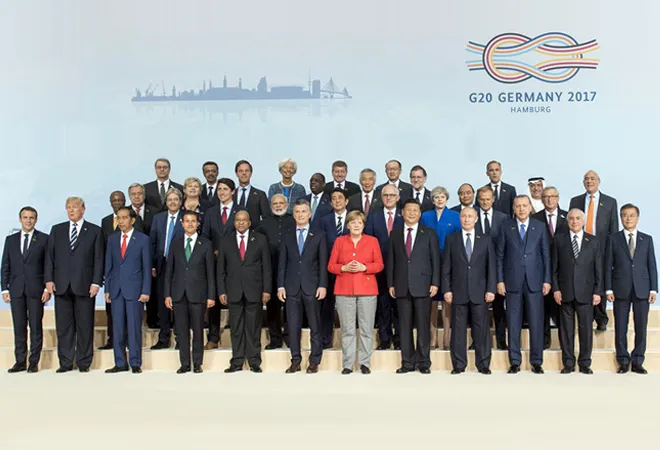The G20 summit, which ended in Hamburg last week, was being held at a time when the biggest threat to world economy — climate change — is confronted with multiple political challenges. Recent developments are a definite cause for concern. First, efforts by the German G20 presidency to retain reference of climate financing in the draft communique has run into resistance from the US and Saudi Arabia.
Second, recent US policies on revising its Clean Power Plan and methane regulations, while underestimating the cost of carbon pollution and lifting of moratorium on coal production and corresponding mining jobs, are bound to have adverse climate implications.
The US has undoubtedly played a key role in addressing many global challenges given its economic, military and diplomatic strength. However, its recent withdrawal from the Paris Climate Agreement would leave a significant gap in meeting global emission reduction targets.
The G20, therefore, needs to demonstrate the power of numbers and guide the future of global climate governance through the strength of emerging partnerships. As a forum for the world’s most powerful economies, representing 85% of global gross domestic product (GDP), the G20 would have presented an ideal opportunity to reaffirm that climate action is in the economic and security interest of all nations.
It is opportune that Germany holds the G20 presidency this year. G20 under German leadership can rightly establish that there are significant opportunities in the global pivot towards non-polluting energy. Germany has announced fostering economic stability; making the global economy viable for future; and establishing G20 as a “community of responsibility,” by promoting investments in infrastructure and renewable energy in Africa, as the “three pillared” objectives of the summit.
Germany recognises that climate risks on the economy could be better managed by linking climate and energy policy more closely. A secure, economically efficient and greenhouse gas neutral energy supply accessible to everyone, in line with the Paris agreement, is a fundamental prerequisite for global economic growth and sustainable development.
Germany has long-standing strategic relations with India and a shared history of successful development cooperation with a thriving partnership in the areas of climate and energy in recent times. The Indo-German Energy Forum (IGEF) and Indo-German Environment Forum (IGEnvF) are making significant contributions to further development of the Indian energy sector and collaboration on environmental issues, including biodiversity management and climate change mitigation. Germany can thus expect complete cooperation and support from India at the forthcoming G20 summit.
The expectations of India, as of the rest of the world, from the German G20 presidency are likely to be centred around bringing a new momentum to the discussions on the climate-energy nexus. In terms of leadership, India expects the G20 to support other developing nations in making progress on ambitious implementation of the Paris agreement. This requires the G20 to provide a long-term direction and certainty through adaptation of common guidelines for the economy, including strengthening technological innovation and employment in future-oriented industries.
India has emerged as a key G20 member who has significantly influenced the ongoing process of reshaping the world’s economic and financial order. India strongly believes that stabilising the world economy and financial markets require joint efforts to mitigate climate risks. For India, it is therefore imperative that G20 leads the global transition in adopting a low emission pathway.
The alignment of G20 policies with the Sustainable Development Goals (SDGs), and emphasis on energy security, is high on India’s agenda.
India hopes that the energy transition, accelerated by the Paris Agreement, must continue. To ensure investments in low emission energy systems and climate resilient infrastructure, India expects the G20 to foster appropriate political frameworks, financing instruments and economic incentives.
Politically, the relationship between other G20 countries and the US (particularly the Trump administration) will most likely remain complicated. India expects the German G20 presidency to convincingly demonstrate that climate change has high cost and is a risk multiplier that jeopardises past and future progress of the global economy.
Thus, our economies and energy systems need to be transformed at an unprecedented scale and speed.
Driving forward, the implementation of the Paris Agreement and the 2030 Agenda in a coherent and mutually supportive manner will provide us with significant opportunities for modernising our economies, for enhancing competitiveness, and stimulating employment and growth.
This commentary originally appeared in Hindustan Times.
The views expressed above belong to the author(s). ORF research and analyses now available on Telegram! Click here to access our curated content — blogs, longforms and interviews.




 PREV
PREV



